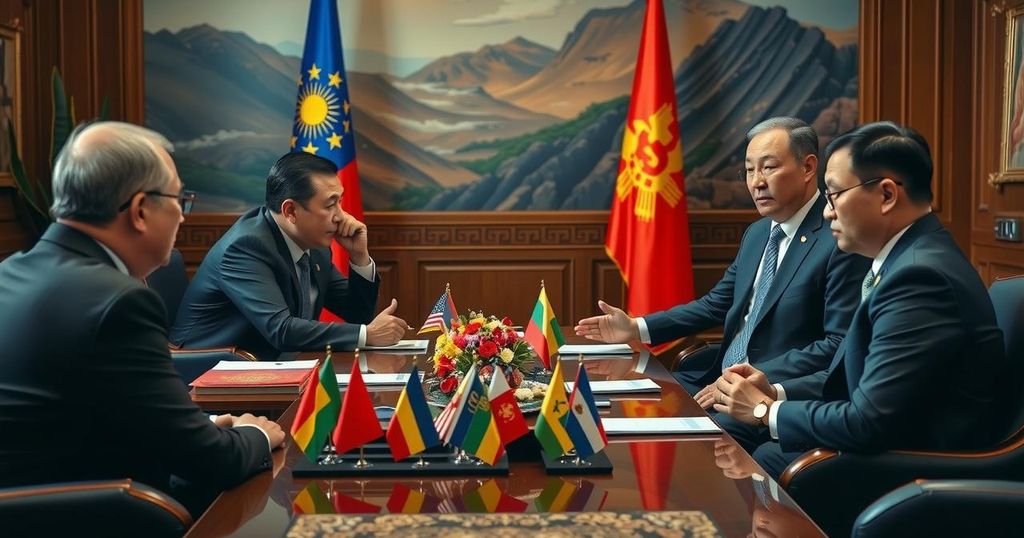Rekindling Diplomatic Ties: Tokayev’s Historic Visit to Mongolia
Kassym-Jomart Tokayev’s state visit to Mongolia was the first by a Kazakh president in 16 years, aiming to renew and strengthen diplomatic and trade ties between the two nations. The visit resulted in significant agreements, including investments in satellite technology and nuclear energy, reflecting an optimistic outlook for future cooperation, particularly in critical mineral exploration and trade, which has surged to $150 million by the end of 2023.
The recent official visit of Kassym-Jomart Tokayev, the President of Kazakhstan, to Mongolia marks a significant development in Kazakhstan’s foreign relations, being the first visit by a Kazakh president in 16 years. This visit underscores an initiative to rejuvenate strategic ties between Astana and Ulaanbaatar, especially considering that although both nations have had diplomatic relations for 32 years, interactions had stagnated during the presidency of Nursultan Nazarbayev due to concerns surrounding Mongolia’s political stability. Historically, political turmoil in Mongolia, such as the violent protests following the 2008 parliamentary elections, contributed to the cooling of relations. Such events created a perception of instability that resonated throughout the region, especially after the tumultuous political upheavals in neighboring countries within the Eurasian landscape. Nevertheless, Tokayev’s recent visit signifies a purposeful approach to renewing these ties, which are particularly significant given the presence of an extensive Kazakh diaspora in Mongolia, numbering over 117,000 individuals, making them the largest ethnic minority there. During meetings with Mongolian President Ukhnaagiin Khurelsukh, discussions revolved around establishing a strategic partnership. These conversations seem to have borne fruit, as evidenced by a notable increase in trade volume between the two countries. Trade turnover, which had fluctuated unfavorably since reaching a peak of $74.8 million in 2017, experienced a remarkable boost, jumping to $150 million by the end of 2023. Tokayev’s optimistic declaration regarding a target of $500 million based on their discussions does not appear to be misaligned with these trends. Moreover, the delegation from Kazakhstan arrived with tangible proposals, which led to the signing of an investment agreement for satellite mapping services to assist Mongolia. This agreement marks a pivotal moment as it initiates the first Kazakh space program. Additionally, an important memorandum was signed to cooperate on nuclear energy development, a sector in which Mongolia seeks to expand its capabilities, following Kazakhstan’s recent advancements in this area. Rustem Mustafin, a notable political analyst, underscored the promise of the concluded agreements, particularly relating to the exploration of valuable mineral resources. He asserted the increasing global demand for critical raw materials, necessitating a collaborative effort between Kazakhstan and Mongolia to explore and develop these resources and to create conducive environments for foreign investment aimed at diversifying both economies. Mustafin highlighted the importance of developing high-tech industries and local educational frameworks to maximize the benefits of such cooperation.
The visit by President Tokayev to Mongolia represents a strategic re-engagement between Kazakhstan and Mongolia after years of tenuous diplomatic relations. The backdrop of this diplomatic endeavor includes a complex history of political instability in Mongolia and a previous lack of constructive dialogue between the two nations. Tokayev’s visit comes at a time when Mongolia is looking to enhance its economic and industrial capabilities, and Kazakhstan aims to leverage its resources and strengthen regional ties. The existing cultural and demographic connections, particularly through the Kazakh diaspora in Mongolia, provide a solid foundation for diplomatic and economic collaboration as both nations seek to benefit from each other’s strengths and opportunities. The region’s historical experiences with political upheaval have informed both countries’ strategies for diplomatic relations, encouraging a forward-looking partnership centered on mutual benefits, especially in sectors of energy and minerals. The agreements resulting from the visit are positioned to foster joint economic projects while also addressing the global demand for critical materials.
In summary, Kassym-Jomart Tokayev’s visit to Mongolia signifies a pivotal step towards renewing and enhancing Kazakh-Mongolian relations after a long period of stagnation. The agreements reached during the visit, particularly in the areas of satellite technology and nuclear energy cooperation, illustrate a mutual commitment to expanding trade and investment opportunities. Given the growing economic ties and shared interests in developing critical mineral resources, it is anticipated that both nations will benefit from a revitalized partnership, marking a new era of cooperation in Central Asia.
Original Source: timesca.com




Post Comment